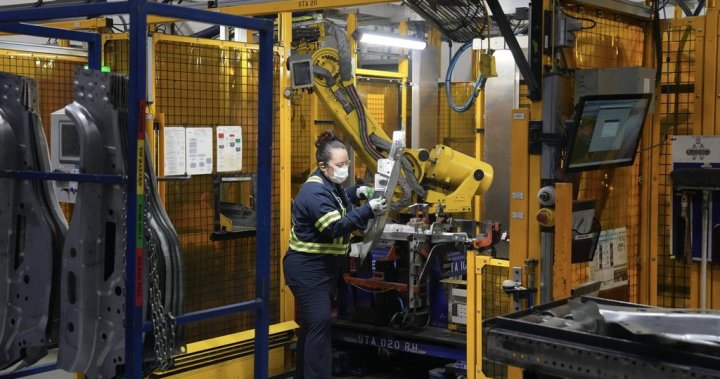The federal government has no plans to use legislative tools to penalize Canadian businesses for offshoring jobs to the United States or other countries to avoid American tariffs, the finance ministry says.
The clarifying statement comes after Unifor urged Ottawa last week to use existing measures to prevent the loss of Canadian jobs to south of the border, and strengthen the law through legislative amendments.
“The government is not implementing legislative tools to penalize Canadian companies who relocate abroad,” a finance ministry official said in a statement to Global News on Monday, following questions asking if the government would use new or existing legislation to do so.
“On the contrary, the government has put in place measures to support Canadian companies so they can continue to do business at home.”
The official cited the recently-announced remission framework that allows Canadian auto companies to import some U.S.-made vehicles tariff-free, “provided they continue to produce and invest in Canada,” as an example of such measures.
The statement comes as Parliament returns for its first session in more than five months, finally allowing legislators to consider measures to respond to U.S. President Donald Trump’s trade war with Canada.

Trump has said his tariffs on Canada and trading partners around the world are intended to drive investment and manufacturing back to the U.S. He has specifically targeted the auto, steel and aluminum industries, which have relied on North American supply chains for decades.
Unifor — which represents tens of thousands of Canadian workers in those industries and others affected by Trump’s tariffs — wrote to Prime Minister Mark Carney and key cabinet ministers last week urging the government to take “immediate and decisive action” to prevent Canadian offshoring in response.

Get breaking National news
For news impacting Canada and around the world, sign up for breaking news alerts delivered directly to you when they happen.
The union proposes using the Foreign Extraterritorial Measures Act (FEMA), which allows Canada’s attorney general to issue orders that prohibit Canadian firms from complying with foreign laws “that are contrary to Canadian interests.”
The law has most notably been cited in allowing Canadian corporations and individuals to keep doing business in Cuba despite a U.S. economic blockade on the island nation, but can be applied to prevent enforcement of other foreign measures in Canada.
The proposal, outlined in detail by the international trade law firm Logie & Associates, suggests the “broad language” in FEMA could be applied “if the attorney general identifies U.S. measures that instruct businesses operating in Canada to ‘offshore’ production to the U.S.”
“This is not a call for new legislation, but rather a call for government to demonstrate its political will,” Unifor national president Lana Payne wrote in her letter to Carney, which was also sent to Attorney General Sean Fraser, Finance Minister Francois-Philippe Champagne and other key ministers.
“FEMA can be activated immediately, though its current enforcement mechanisms are limited. Legislative amendments, to be introduced when Parliament resumes, could strengthen its effectiveness, including with new Customs Tariff authorities to impose severe penalties on non-compliant firms.”
Enhanced measures could include import restrictions and asset seizures, Payne wrote.

A spokesperson for Fraser’s office told Global News last week it was aware of Unifor’s proposal and would “review it carefully.” The office did not immediately respond to a request for an updated comment Monday.
Michael Devereux, an economics professor at the University of British Columbia, says the idea of government penalties and other measures to prevent offshoring is a bad one — particularly in the context of an ongoing trade war.
“We’re in the middle of a very uncertain and complicated series of negotiations on the general trading relationship with the U.S., and so I think it would just complicate things,” he said in an interview.
Devereux said offshoring penalties could both incentivize Canadian firms already eying the U.S. or other foreign markets to leave entirely to avoid punishment, leaving behind “a stable of inefficient corporations” no longer willing to invest or expand abroad.
“It could end up being a reverse failed industrial policy,” he said.
He added that additional penalties could also invite retaliation from the U.S. and impact negotiations to update the Canada-United States-Mexico Agreement on free trade (CUSMA).
“I think subsidies for Canadian corporations for investment would be a much better strategy” combined with counter-tariffs on the U.S., he said.

Unifor’s proposal was sent days after Honda announced it was pausing its $15-billion investment in electric vehicle production in Ontario. The delay was one of several recent defensive moves by the industry attributed in part to falling profits and higher costs due to Trump’s auto tariffs.
“Trump’s rollback of EV policies and his punishing tariffs on Canadian-made vehicles are killing jobs week after week and threatening the future of our industry,” Payne at the time the postponement was announced.
Honda last month was forced to confirm it was keeping its operations in Canada “for the foreseeable future” after a media report suggested it was considering plans to switch some car production to the U.S.
Carney has promised to fast-track Canadian energy project development and new investments that will shore up domestic supply chains for the auto sector and protect against U.S. tariffs, among other economic measures.
The government is currently in talks with the U.S. on new trade and security partnerships, which could lead up to the G7 Leaders’ Summit in Alberta next month, where Carney and Trump are set to meet.
© 2025 Global News, a division of Corus Entertainment Inc.



